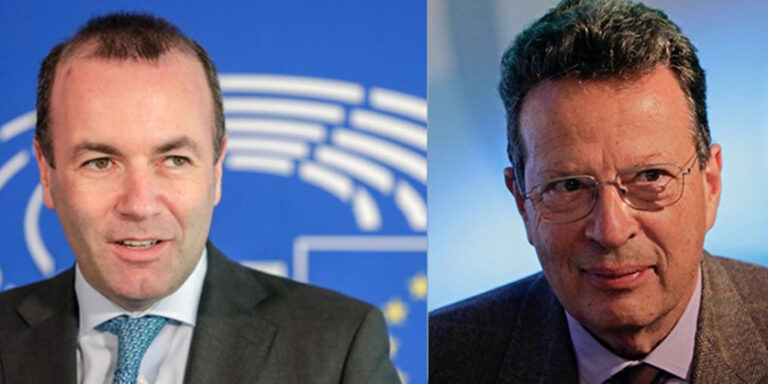Following Greece’s ruling centre-right New Democracy party’s (European People’s Party) expulsion of EU lawmaker Giorgios Kyrtsos from its ranks because of his criticism against the government over media freedom and the handling of the pandemic and the subsequent support offered to the decision of the Greek government by prominent German politician Manfred Weber in a Tweet, Kyrtsos responded with a letter to the German MEP stressing he ‘strongly protests’ over the Tweets.
New Democracy had issued a statement last week saying “He discredits the country globally by questioning the independence of the Greek judiciary and comparing Greece with states that violate the rule of law. With his attitude, he insults all those who trusted him to represent them”.
The party added that for a long time Kyrtsos has been posting on social media comments “hostile” toward the party and Prime Minister Kyriakos Mitsotakis.
The announcement added that the ruling party has so far been tolerating such posts but comparing Greece with Poland and Hungary could not be accepted.
The German politician is known to have a good relationship with Kyriakos Mitsotakis, who had supported him in 2019, in his campaign for the presidency of the Commission. With his post, however, the German politician puts an end to the whispers as to what is and is not discussed in Europe about the persecution of journalists, responding from the EPP to the reproaches addressed by George Kyrtsos.
“We firmly reject the baseless accusations against the Greek government by @GiorgosKyrtsos. We find them unacceptable. Following these events an internal procedure will be launched against MEP Kyrtsos”, Weber tweeted in support of the Greek government.
We firmly reject the baseless accusations against the Greek government by @GiorgosKyrtsos. We find them unacceptable. Following these events an internal procedure will be launched against MEP Kyrtsos.
— Manfred Weber (@ManfredWeber) February 18, 2022
Kyrtsos responded to the German MEP via the following letter:
Brussels, February 21, 2022
Dear Mr. Weber,
I strongly protest for the following tweet of yours:
“We firmly reject the baseless accusations against the Greek government by Giorgos Kyrtsos. We find them unacceptable. Following these events an internal procedure will be launched against MEP Kyrtsos.”
You take sides in a dispute I have with the PM Mr. Mitsotakis without knowing exactly what is going on and without having the sensitivity of asking my view before unleashing a personal attack against me. My almost eight-year long presence in the EPP’s political group in the European Parliament should have made you more cautious and responsible.
Expulsion from Nea Demokratia party
Mr. Mitsotakis decided my expulsion from ND (Nea Demokratia) on Friday, February 18, 2022. This was the end of a political relation that had its ups and downs.
I was, along with Maria Spyraki, the only MEP, or Member of Parliament that supported Mr. Mitsotakis and signed in favour of his bid for the leadership of the party.
After his election in the leadership, I played a major role in opposition against the SYRIZA government and policies, preparing the ground for Mr. Mitsotakis and ND’s electoral victory in the 2019 elections.
Until September 2020 my overall judgment of Mr. Mitsotakis’ and the government’s work was positive. I even made enthusiastic comments about the PM’s and the Greek government’s ability to adequately protect the population from the pandemic during the critical period (March 2020 – September 2020).
In September 2020 things began to change. I criticized the government for the bad state of the transportation system in Athens and Thessaloniki and the danger of COVID-19 spreading through the congestion of passengers.
I received a phone call from the office of the PM asking me to avoid that type of criticism because I was supposedly helping the main opposition party (SYRIZA). I told them that it was my duty to try to improve the everyday life of citizens and protect public health in the demanding COVID-19 environment.
In November 2020 the number of deaths due to the pandemic started to increase in Greece. By then, it was obvious that the government was not taking at all the necessary measures and the application of the existing measures was not effective.
I started asking for the implementation of a comprehensive policy that would protect the population from a big increase in the number of deaths.
The government did not respond to my proposals. The PM himself called me in April 2021 and told me that I was risking expulsion from ND if I continued criticizing the government for the way it was handling the pandemic crisis. I told him that I felt it was my duty to strive for a more effective policy against the pandemic and that he was free to assume the responsibility for my expulsion from the party.
At the time, I thought the government’s relative inaction would eventually lead Greece to a humanitarian crisis. This is exactly what happened.
The pandemic has already cost Greece almost 26.000 deaths. This is a huge number for a country with a serious demographic problem. The annual births in Greece have fallen to 85.000 due to the economic and social crisis and the population of the country shrinks at a rate of 50.000 – 60.000 per year.
During the last months, Greece is consistently one of the 3-4 countries in the EU’s 27 with the worse performance in terms of deaths per million inhabitants.
We lose 70-100 lives per day with a population of 10.5 million and Mr. Mitsotakis decided to allow professional football games with spectators at 50% of the capacity of the stadiums and the functioning of nightclubs at 100% capacity.
It is obvious that we have opposing views on how to tackle the pandemic and I will not change mine.
Towards a new Greek crisis?
As time went by, it became clear to me that the government was not able to deal effectively with other issues, like managing the economy and dealing with the new energy crisis.
To cut a long story short, Greece has acquired – due to the policy of the government – a crippling dependency on imported natural gas and has one of the highest wholesale energy prices in the EU’s 27, despite the fact that its per capita GDP has fallen to almost 2/3 of the European average.
In addition, if you compare basic statistics with 2008 – the year before the Greek crisis exploded in the Eurozone – you reach the conclusion that the probability of a new Greek crisis is rather high.
In 2008, the public debt was 125% of the GDP. Now it has reached 200% of the GDP.
In 2008, the public deficit exceeded 10% of the GDP. For both 2020 and 2021 the public deficit was at 9%-10% of the GDP.
In 2008, Greece had a huge current account deficit, 15% of the GDP. After a period of very low deficits in the current account, the deficit increased to more than 6% of the GDP in 2020 due to the COVID-19 tourist crisis. In 2021, tourism receipts increased to 60% of the record-year 2019 level. At the same time, the trade deficit increased by 33% relatively to 2020 due to the high price of imported petrol and natural gas and the chronic lack of competitiveness that characterizes the Greek economy.
I devoted my first 5-year term in the ECON Committee dealing with the Greek crisis and I would not like to devote the second half of my second 5-year term in the European Parliament dealing with the next Greek crisis which will spill over to the Eurozone.
As one might have expected, I intervened in the public debate about the economy asking Mr. Mitsotakis to improve his policy and performance because the situation is already difficult and could become critical.
The recent increase in the interest rate of the 10-year bond of the Greek State and the spread shows that the markets have begun a re-evaluation of the situation and the perspective of the Greek economy.
In my view, Mr. Mitsotakis is projecting a managerial image without having an appropriate economic policy in order to stop the slide of Greece towards a new economic crisis.
My public criticism of the economic policy of the government aimed at initiating a constructive debate and the search of the appropriate policy.
The Novartis scandal
During the last months, the Novartis scandal, that poisoned Greek political life during the SYRIZA period made a spectacular comeback.
The government failed to initiate proceedings against Novartis, the Swiss multinational pharmaceutical company and demand compensations for its unfair practices, despite the assurances given by the Minister of Finance and Mr. Mitsotakis himself.
Novartis has already paid huge fines – around 350 million dollars – to the competent USA authorities for its unfair marketing practices in Greece and other countries. The Greek people expect that the Swiss multinational will be forced, through judicial process, to return part of the money it overcharged the Greek social security system. One of the reasons for the Greek State’s bankruptcy was the multiplication of the cost of pharmaceuticals covered by the Greek State and the Greek taxpayers. Novartis was one of the protagonists in this process.
In addition, the government created the political environment for the persecution of two investigative reporters and a senior judge who made research and evaluated documents concerning the possible involvement in the scandal of 10 politicians and personalities opposed to the SYRIZA government.
I reached the conclusion that there was a strong element of political expediency on the part of the SYRIZA government in the persecution of the 10 and I strongly supported them. After a time consuming judicial process 9 out of the 10 accused, were totally exonerated.
Now the pendulum of Greek politics moves the other way. The Mitsotakis’ government exerts political pressure in favour of the persecution of the 2 journalists with close ties to SYRIZA and the senior judge (she has already been invited to address the relevant Committee in the European Parliament).
During my professional life, I was the managing editor of the major pro Nea Demokratia tabloid newspaper. Later on, I became the owner and publisher of City Press and Free Sunday, major titles in the free-press category.
I do not think that persecuting opposition journalists has anything to do with liberal democracy. I also find unacceptable the persecution of a senior judge who was responsible for the cleansing of the Novartis scandal.
Speaking in the Greek Parliament, Mr. Mitsotakis referred to the two journalists as a “gang”. I strongly objected to the characterization which is completely out of the liberal European context, as far as the rule of law is concerned. The PM gave the impression that he wanted to influence the ongoing judicial process against the two journalists.
Orban talks about illiberal democracy and uses illiberal methods. Mr. Mitsotakis promotes himself as a champion of liberal democracy but uses illiberal methods in order to prevail.
He announced my expulsion from the party through the newly appointed secretary general without referring the issue to a disciplinary committee and without offering me the opportunity to present my case.
Mr. Mitsotakis personally warned for my imminent expulsion back in April 2021. I was surprised that he chose the battleground of Novartis in his effort to justify his authoritarian practices.
He accused me of degrading the image of Greece and the government in the European Union. That kind of accusation is usually used by post-Soviet authoritarian regimes. In their view, whoever has a different opinion could be an enemy of the state or the nation.
In my view, the negative image of the government in European media and possibly in the European institutions is the result of Mr. Mitsotakis’ illiberal practices.
The precedent of Zagorakis
I am not the first Nea Demokratia MEP who was expelled by Mr. Mitsotakis. Two years ago, MEP Zagorakis was expelled when he publicly accused the PM of promoting the interests of powerful enterpreneurs who own football teams that antagonize PAOK, the team supported by Mr. Zagorakis. He was a star football player, captain of the Greek team that won Euro 2004 and also president of PAOK.
The accusation made by Mr. Zagorakis against Mr. Mitsotakis was degrading, relative to my political criticism, because he implied the collaboration of the MP with big private interests against a third party.
After almost a year, Mr. Zagorakis was welcomed back in the group of Nea Demokratia’s MEPs without retracting his accusations against Mr. Mitsotakis. The PM was so pleased with the MEP he expelled from the party that he even promoted his appointment as President of the Greek Football Association!
The case of MEP Zagorakis proves that the EPP Group coexists with Nea Demokratia MEPs expelled by Mr. Mitsotakis. That should be done in my case, as well. My presence in the EPP should be judged on the basis of my spotless parliamentary record since 2014. Not on the basis of my criticism to the policies and practices of the Mitsotakis government.
After all, it is Mr. Mitsotakis who follows illiberal practices and I am the MEP who openly objects to them, following the liberal line that led to the expulsion of Orban and Fidesz from the EPP. As MEP Kokkalis noted (SYRIZA-THE LEFT), Mr. Mitsotakis instead of taking note of the criticism and correcting his policies on the basis of European standards, decided to get rid of the messenger…Best liberal regards,
Dr. Georgios Kyrtsos
MEP
Ask me anything
Explore related questions





